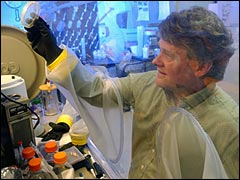A company called Renmatix says it can make ethanol from wood and woody biomass using nothing but water. If they're right — and they just cut the ribbon on an R&D facility in Pennsylvania in order to find out — it could mean the unlocking of a vast reserve of biomass previously untouched by the cleantech industry.
The cellulose in trees and other woody biomass is so tough that its has so far been impossible to turn it into ethanol at a commercially viable scale — despite a congressional mandate for the production of cellulosic ethanol. Renmatix's process gets around the shortfalls of other attempts to produce the fuel — which required expensive enzymes and acids — by transforming water into a state that is neither a liquid nor a gas.
At a sufficient temperature and pressure, water becomes "supercritical," which means, among other things, that it flows like steam yet is as dense as water. It has other exotic properties in this state, as well, including the fact that you can manipulate its acidity without actually adding any acid to it. This is the secret of the Renmatix process, which allows the company to break apart the usable sugars in cellulose.
It's a long way from a pilot plant to a commercially viable process, though. One point in its favor: There’s no technical mystery to producing supercritical steam. We already do it for advanced coal and nuclear power plants.



